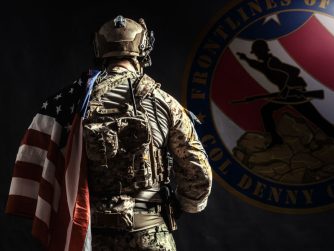The slaughter in Orlando again raises the question of what we should do about attacks like this. But first, we must answer a more fundamental question: Was this a criminal act or an act of war?
If these attacks are criminal acts, then the criminals must be punished for their actions. If these are acts of war, then the enemy forces must be found and destroyed, not based on what they might have done, but to destroy the enemy before they can strike again—we want to win the war.
The rules of war and those for criminal justice are vastly different. Had President Roosevelt said after Pearl Harbor that he intended to bring everyone who planned the Pearl Harbor attack to justice, he would have been foolish. The Japanese staff officers and pilots had not committed a crime. The Empire of Japan committed an act of war.
Bush announced a war on Terror. But terror isn’t an enemy. Terrorism is like tanks or battleships; they are tools of war.
It’s now almost 15 years since 9/11 and we still haven’t answered the key questions: Are we at war or fighting criminals? And if we are at war, who with? To distinguish between crime and war, you look at intent, not means. Criminals basically pursue money. Terrorists pursue political ends; thus, their attacks are consistent with war. War is intimately bound up with politics. Crime is not.
Since the rise of al-Qaida, there has been a consistent Islamist goal: to overthrow “hypocritical” Muslim states and replace them with jihadist regimes that would create a united global Muslim state, or caliphate. Most also want this caliphate to then rule the world.
To do this, the jihadists needs first to convince the Muslim masses that they’ve been betrayed by their governments, and that they can seize control of their own destinies.
Secondly they must drive the US and other non-Muslim powers out of the Islamic world. Terrorism is intended to drain the enemy of its will to continue and force withdrawal. This is the same goal of the mass bombings of WWII.
This works, because terrorism does not require major organization or resources. It simultaneously strikes at the enemy, and empowers all its supporters who wish to be empowered.
So, there is no question that the terrorism we are experiencing is acts of war– not criminal. The problem is defining the enemy. We know that all Muslims are not jihadists. We also know that all jihadists are Muslims.
In this war, the jihadists are hard to identify. The Geneva Convention acknowledges the right of civilians to be treated as soldiers, however, they must meet criteria. First, they must carry their weapons openly. Second, they must wear clothing that identifies them as warriors. They must also follow the rules of war–like not targeting non-combatants.
The jihadists are not playing by the rules of war and have no rights under the Geneva Convention; they’re war criminals. This does NOT give jihadists access to the criminal justice system.
Since the goal of a war is to render the enemy incapable of waging war, that goal can be thwarted by covert operations. Here the defender must wait for the next attack and defend an impossibly large set of targets, or identify enemy operatives who have blended into the general population or are drawn from it. The best way to do this is to track known jihadist operatives and see who they make contact with.
So, ISIS avoids contact with their potential operatives. Instead, it encourages those with little or no direct contact with them to design and execute terror attacks that maximize casualties and thereby shake the target country. Like all ideological movements, it’s possible to both know the goal and participate in actions in some way without having contact with the main organization. These lone wolves are alone only in the sense that they lack personal contact. They are deeply in contact with the ideology.
This brings us back to defining who we’re at war with. The obvious answer is that it’s with the jihadist strand of Islam; I call it Radical Islam. The problem is that they are not only covert, but also embedded in the Muslim community as a whole—and the Muslim community is not dealing with this issue internally; most are ignoring it–perhaps out of fear.
We have international law on our side, but that doesn’t solve the problem of how to wage this war. The enemy is indistinguishable from friends. You can only identify the jihadists by intruding deeply into the community, and beyond. You can intercept phone calls and emails. You can also plant operatives in mosques. There are many actions that can be taken – but all are obnoxious to American values.
There are many challenges that must be debated. But first we must face some truths. This is a war, and jihadists are the enemy. Not all Muslims are jihadists, but all jihadists are Muslims.
Giving up some liberties may be too high a price, but we should be honest in identifying the price we will pay. In addition, some tactics may seem plausible, but will not solve the problem in the end. Stopping Muslims from coming to the country, for example, may seem reasonable, but it’s easily bypassed. We must be honest that the war, which has raged for 15 years, will go on for a long time to come. We can bring our troops home, but jihadists will follow them. All of this must be honestly considered. But we like to lie to ourselves, and that’s the real enemy.
So, can we get “real” with ourselves?



